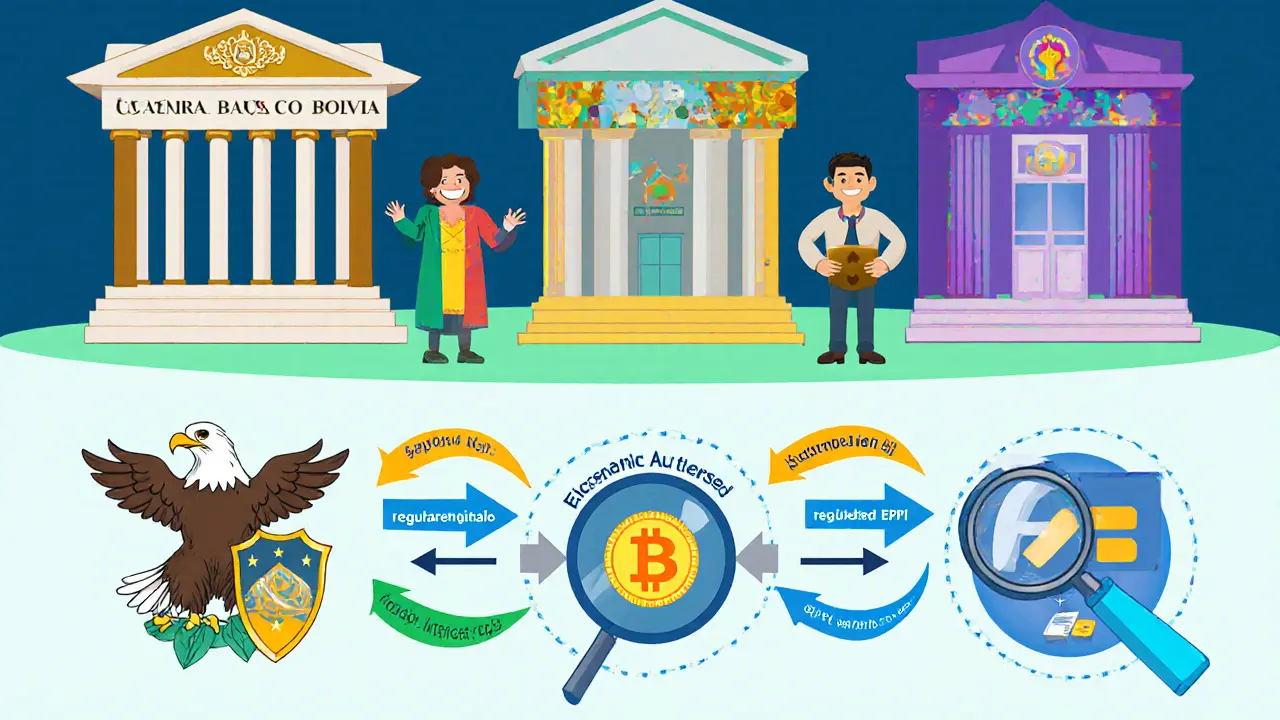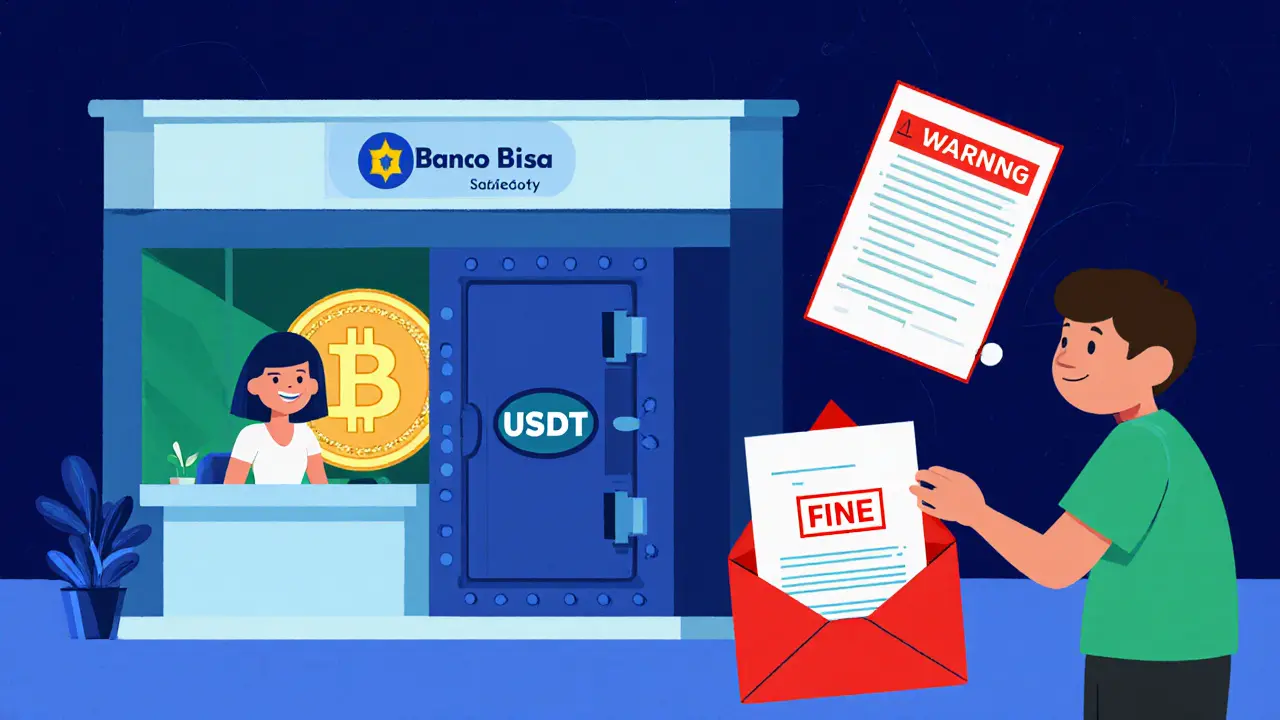Bolivia Crypto Penalty Calculator
Calculate potential fines for common crypto violations in Bolivia based on current regulations. This tool helps you understand the financial impact of non-compliance with Bolivia's crypto rules.
Estimated Penalty
Imagine waking up to a hefty fine because a crypto transaction slipped through the wrong channel. In Bolivia, that nightmare can become reality if you don’t know the current legal landscape. Bolivian cryptocurrency regulation is the set of rules governing the use, trade, and reporting of digital assets in Bolivia as of 2025. This guide walks you through the evolution from a total ban to today’s compliance‑focused regime, and explains exactly what penalties can bite you if you stray.
From total prohibition to regulated acceptance
Back in 2014 the Central Bank of Bolivia (BCB) issued a sweeping ban on all crypto activities. The ban was intended to protect the boliviano and guard against financial instability, but the regulations never listed exact fine amounts-just a blanket “illegal activity” label.
Fast‑forward to June 2024, when the government lifted the ban with Board Resolution N°082/2024 a formal decree that repealed the 2014 prohibition and introduced a regulated framework for virtual assets. The result? A 630 % surge in crypto transactions in the first year, with volumes jumping from $46.5 million at the start of 2024 to $294 million by mid‑2025.
Who watches the market?
Three bodies now share oversight:
- Central Bank of Bolivia (BCB) the primary regulator that sets policy for electronic payment instruments and virtual assets
- Financial System Supervisory Authority (ASFI) provides additional supervision of financial institutions handling crypto transactions
- Financial Investigations Unit monitors for money‑laundering and illicit transfers involving digital assets
All crypto trades must flow through licensed banks or authorized electronic payment channels. Any off‑exchange transfer that bypasses these channels is flagged for enforcement.
Compliance requirements you can’t ignore
To stay on the right side of the law, follow these steps:
- Only use Electronic Payment Instruments (EPI) approved channels that enable virtual‑asset transactions under BCB guidelines for buying, selling, or sending crypto.
- Register any exchange or service provider with the BCB and ASFI. Unregistered platforms are considered illegal.
- Ensure your bank reports crypto activity daily and cross‑checks it against international sanctions lists.
- If you settle business invoices or payroll with stablecoins, do it through a licensed bank - the boliviano remains the only legal tender for direct payments.
Current penalty structure
Today’s enforcement focuses on two main violations:
- Unauthorized channel use: Sending crypto outside the licensed banking or EPI network can lead to administrative fines, asset freezes, and potential criminal prosecution. Exact amounts are decided case‑by‑case, but they can reach up to several months’ worth of the offender’s reported income.
- Failure to register: Operating an exchange or wallet service without registration invites a hefty fine (often reported in the range of 10,000-50,000 bolivianos) and a shutdown order.
There is no specific capital‑gains tax for individual traders, but business‑related crypto profits-such as mining, staking, or stablecoin‑based services-are subject to a 25 % Corporate Income Tax (CIT) tax on profits generated by crypto‑related commercial activities. Non‑compliance with tax reporting can add additional penalties on top of the regulatory fines.

Case study: Banco Bisa’s stablecoin service
In October 2024, Banco Bisa one of Bolivia’s leading banks that launched a custodial service for USDT began offering USDT custody for clients. The service requires every transaction to be logged through the bank’s EPI platform, and the bank submits daily reports to the BCB. Users who tried to sidestep Banco Bisa and move USDT via unregistered foreign exchanges faced warning letters, followed by fines when the behavior persisted.
Tax takeaways for traders
For hobbyists, the tax bill is simple: no capital‑gains tax on personal crypto gains. However, keep records of purchase price and sale price in case the tax authority requests proof that the activity remains personal and not a business.
If you run a mining farm, stake tokens, or provide crypto‑payment services, you must file corporate tax returns and pay the 25 % CIT on net profits. Failure to do so can trigger tax audits, retroactive tax assessments, and additional penalties that double the original tax liability.
Enforcement mechanisms you should watch
Every licensed bank runs a real‑time verification engine that checks each crypto transaction against the UN Sanctions List, OFAC, and regional watchlists. Suspicious activity reports (SARs) are automatically forwarded to the Financial Investigations Unit, which can freeze assets pending investigation.
The government also runs public awareness campaigns to educate citizens about scams and the importance of using authorized channels. While the focus is on consumer protection, the penalty risk remains high for anyone who deliberately circumvents the system.

Practical checklist for safe crypto trading in Bolivia
- Verify that your exchange is registered with BCB and ASFI.
- Always route trades through a licensed bank or an approved EPI platform.
- Keep detailed records of transaction dates, amounts (in USD and bolivianos), and counterparties.
- If you receive stablecoins for payroll, confirm the receiving bank’s custody service is authorized.
- Monitor your bank’s daily crypto reports for any discrepancies.
- Stay updated on any new resolutions or amendments from the BCB-penalties can shift quickly.
Quick comparison: Pre‑2024 ban vs. 2025 regulated regime
| Period | Status of Crypto | Typical Enforcement | Penalty Range |
|---|---|---|---|
| 2014‑2024 | Complete prohibition | Criminal investigations, asset seizure | Undisclosed fines, possible imprisonment |
| 2024‑present | Regulated, but only via licensed channels | Administrative fines, transaction freezes | Up to several months’ income or 10,000‑50,000 BOB per violation |
What to do if you receive a penalty notice
First, don’t ignore it. Respond within the 15‑day window outlined in the notice, providing any missing documentation (transaction logs, registration proof, etc.). If the fine seems excessive, you can appeal to the BCB’s dispute committee. Many small‑scale traders have reduced penalties by showing good‑faith compliance and a willingness to register their activity.
Frequently Asked Questions
Is it illegal to own Bitcoin in Bolivia?
Owning Bitcoin is not a crime, but you cannot trade or transfer it outside the authorized banking or EPI network. Unauthorized transfers can attract fines.
Do I need to pay tax on my personal crypto gains?
No capital‑gains tax applies to individuals. Keep records, though, in case the tax authority asks for proof that the activity is personal.
Can businesses use stablecoins for payments?
Yes, but only through a licensed bank that offers a stablecoin custody service, like Banco Bisa. Direct peer‑to‑peer stablecoin payments are still prohibited.
What are the biggest penalties for unregistered exchanges?
Unregistered platforms can face fines ranging from 10,000 BOB to 50,000 BOB and a court‑ordered shutdown. The BCB may also seize assets linked to the illegal operation.
How does the Financial Investigations Unit get involved?
The Unit reviews suspicious activity reports from banks. If a pattern of off‑channel crypto transfers is detected, they can freeze assets and launch a money‑laundering investigation.


Marina Campenni
Thanks for putting together such a clear overview of the Bolivian crypto landscape; it's helpful to see the chronology and the specific steps traders need to follow in order to stay compliant.